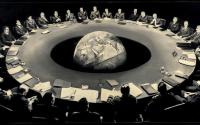15 November 2005Oneworld.net / SciDev.NetNalaka Gunawardene
Soon after the Asian tsunami left a trail of destruction around the Indian Ocean rim, a second wave hit — as local and foreign journalists arrived to begin intense and incessant coverage of the unfolding humanitarian crisis.
In a few dreadful hours, the tsunami killed, injured or otherwise shattered the lives of millions. The 'media tsunami' that followed turned the plight of affected people into a global information circus. The rights to privacy and dignity of thousands of people were repeatedly violated.
The visual media, in particular, had no qualms about showing the dead, injured and orphaned. Of course, the rest of the world had a right to know — and media coverage helped inspire the fastest and largest ever donation of disaster aid.
But did that justify victims' most vulnerable moments being beamed around the world at light speed? I'm not so sure.
My concern with communication rights in the information society is this: exactly whose rights are we talking about, and what violations or denials are we agitating against?
Understandably, the mainstream media defend their right to free expression, and individual journalists have concerns about media ownership and the many pressures they face at work. Meanwhile, a new breed of information activists — inspired by the proliferation of information and communication technologies — are preoccupied with lofty issues such as intellectual property, Internet governance, privacy and equal access.
Misrepresenting the South
These issues are all important, and must indeed be addressed. But if the information society is to include everyone, we need to move beyond these interests that are near and dear to us, the vocal minority.
In our self-righteous analysis, we in the media and in activist circles often fail to see the bigger picture. We also overlook the 'communication wrongs' that we ourselves commit, even if only inadvertently.
The ICT and mass media landscapes are littered with examples. Photojournalists roam war zones and disaster scenes, usually in the developing world, looking for the next image they will use to tug at the world's conscience. But how many seek the informed consent of their subjects, even when circumstances allow it?
Shahidul Alam, who heads Drik Picture Library in Bangladesh, recently expressed concern that photojournalists are increasingly manipulating reality to get ever more dramatic images. In that process, they compromise journalistic integrity and trample on communication rights.
I join Alam in criticising a globalised media persistently using stereotyped images of the South — captured mostly by northern photographers and camera crews.
"Invariably, films about the plight of people in developing countries show how desperate and helpless they are... Wide-angle black and white shots and grainy, high-contrast images characterise the typical Third World helpless victim," he says.
Media gatekeepers in the North often dismiss the better-informed and equally competent Southern professionals — saying, insultingly, that 'they don't have the eye'! And for years, I have resisted the widespread practice of Northern broadcasters and filmmakers using the South's top talent merely as 'fixers' and assistants.Information needs of the poor
Guilty of these and other communication wrongs, the media are certainly not alone in stepping on others' communication rights. When development agencies and 'pro-poor' activists presume — in their middle class arrogance — that the impoverished just need information about survival or sustenance, the latter's communication rights are shattered.
The information needs — and wants — of the poor are as wide and varied as everybody else's. Sarvodaya, Sri Lanka's largest development organisation, once surveyed the information needs of poor people in rural and semi-urban areas.
It was found they wanted information on health and nutrition, as well as details of bank loans, foreign jobs and insurance policies. There was also considerable interest in world affairs, new books and movies, national politics, and questions being asked in parliament.
To ignore this diversity and assume that farmers only want to know about the weather and crop prices is grossly insulting. We must stop treating poor people as some kind of subhuman species with a simpler set of living needs and aspirations.
The list of communication wrongs by the media and other groups is long and depressing.
The first step toward promoting communication rights is to stop these wrongs, whether they're acts of omission or commission. Throwing funds and experts at problems — as governments, aid donors and UN agencies often do — won't take us very far. Neither will endless pontificating and agitating from activist platforms.
What we need is soul-searching and self-correction.
Ensuring communication rights for all in the information society is not a mere slogan or campaign; it is an integral part of social justice, and a goal that is attainable with our current technologies and resources. This week's World Summit on the Information Society (WSIS) risks being distracted by the human rights record of the host nation, Tunisia, or the question of who will eventually govern the Internet. The real issues are neither micro nor soft — they are macro and hard.
As the planet's info-elite gather in Tunis, they should take note of the trampling, abuse or outright denial of ordinary people's communication rights on a daily basis.
The media and development communities are currently part of the problem. Information and communication technologies may have launched our world on a course towards becoming a 'global village'. But we won't become a true global family unless and until we engage fellow villagers in our conversation.
Nalaka Gunawardene is director of the non-profit media organisation TVE Asia Pacific (www.tveap.org), and a commentator on information and communication technologies for development.






